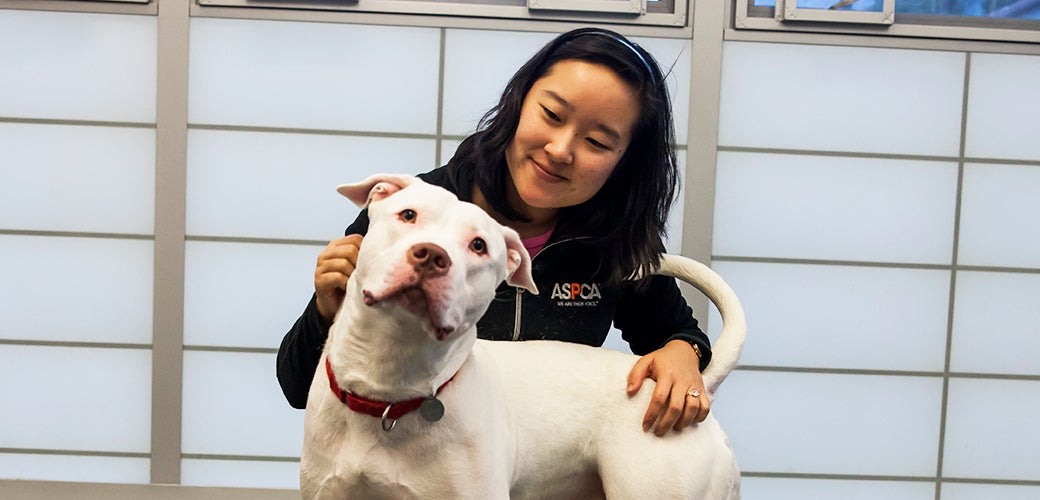Understanding the Role of a Veterinary Behaviourist in Pet Training and Well-being
The function of a vet behaviourist is important in resolving the elaborate partnership between animals and their proprietors. They incorporate vet medicine with understandings from animal behavior scientific research to deal with issues like aggressiveness and stress and anxiety. Unlike traditional instructors, their method focuses on the underlying reasons for these behaviors. This nuanced viewpoint questions regarding the effectiveness of traditional training methods and exactly how a deeper understanding can transform pet health. What methods do they employ to accomplish these results?
What Is a Vet Behaviourist?
A veterinary behaviourist is a specific professional who concentrates on understanding and resolving the behavior concerns of animals, especially pets. Their proficiency incorporates veterinary medicine and pet behavior scientific research, enabling them to identify and deal with a broad array of behavioral problems - veterinary behaviour. These experts frequently hold sophisticated levels, such as a Master's or PhD in animal habits, and are certified by relevant organizations, guaranteeing they have a deep understanding of animal psychology
Veterinary behaviourists examine pets through thorough observation and evaluation, taking into consideration elements such as genes, setting, and training background. They develop tailored therapy strategies, which might consist of desensitization techniques, positive reinforcement techniques, and ecological changes. Cooperation with pet owners is necessary, as they give guidance and support throughout the training process. Eventually, the goal of a veterinary behaviourist is to improve the wellness of the animal while promoting a harmonious connection between animals and their owners.
The Significance of Comprehending Pet Actions
Recognizing animal behavior is necessary for both animal owners and professionals in the area of pet treatment, as it lays the foundation for efficient communication and training. Recognizing just how pets regard their atmosphere and react to stimuli enables caretakers to develop an extra unified living scenario. Understanding right into behavior signs, such as body movement and articulations, fosters stronger bonds in between pets and their proprietors. By appreciating the natural impulses and demands of various species, people can customize their training approaches to fit these variables, advertising better understanding and cooperation. In addition, a strong understanding of behavior science aids in recognizing stressors and possible triggers, permitting aggressive interventions. Generally, understanding pet behavior not just boosts the wellness of pets but additionally enhances the experiences of those that take care of them, ultimately bring about much healthier, happier connections.
Usual Behavioral Issues Addressed by Vet Behaviourists
Veterinary behaviourists regularly attend to typical behavior issues in animals, consisting of aggressiveness and fear feedbacks. They additionally concentrate on anxiousness and tension management, which can considerably affect a pet's health. Understanding these issues is crucial for creating reliable training and intervention approaches.
Hostility and Anxiety Responses
While lots of animal owners may view hostility and fear feedbacks as straightforward behavioral concerns, these complicated reactions frequently stem from underlying stress and anxiety or past injury. Vet behaviourists play a vital function in identifying the root causes of these actions, which can manifest in numerous kinds, including growling, attacking, or excessive anxiety of particular circumstances. Comprehending these triggers is essential for establishing reliable training approaches tailored per pet dog's one-of-a-kind conditions. Behaviourists use techniques such as desensitization and counter-conditioning to assist animals handle their worries and hostility. Furthermore, they inform pet proprietors about ideal administration techniques, emphasizing the importance of persistence and uniformity. Resolving hostility and worry actions not just enhances the pet's lifestyle but also reinforces the bond between family pet and proprietor.
Anxiety and Tension Administration
Anxiety and tension prevail problems that several pets encounter, frequently resulting from adjustments in their environment, lack of socializing, or previous adverse experiences. Vet behaviourists play an essential function in determining the underlying root causes of these problems. They use various methods, including behavior adjustment, desensitization, and counter-conditioning, to aid family pets manage stress and anxiety. On top of that, they might recommend environmental changes, such as creating secure areas or providing enrichment activities that advertise relaxation. Collaboration with family pet owners is crucial, as behaviourists assist them in understanding their pet dog's signals and carrying out reliable coping strategies. By dealing with anxiousness and stress and anxiety, veterinary behaviourists add considerably to boosting the general wellness and quality of life for family pets and their households.
Exactly How Veterinary Behaviourists Vary From Standard Fitness Instructors
Veterinary behaviourists differ from typical instructors mostly in their educational histories and training. While conventional instructors commonly focus on obedience and standard commands, veterinary behaviourists emphasize understanding and attending to underlying behavior concerns, integrating medical considerations into their strategy. This distinct focus enables them to provide a more complete therapy for animals with complex behavior obstacles.
Education And Learning and Training Differences
Understanding the distinction between veterinary behaviourists and conventional trainers is crucial for animal proprietors seeking efficient training services. Veterinary behaviourists possess innovative levels in vet medication, typically adhered to by specialized training in pet practices. This education equips them to deal with complicated behavioral issues that might stem from medical conditions or emotional elements. In contrast, standard fitness instructors usually have accreditations from training programs that focus on obedience and fundamental commands without diving right into the underlying emotional or clinical facets. While both experts intend to boost animal behaviour, vet behaviourists can identify and treat behavioral issues holistically, click to read integrating medical expertise into training strategies. This essential difference highlights the importance of choosing the ideal professional based upon the pet dog's certain demands.
Concentrate On Behavioral Issues
Addressing behavioral problems calls for a nuanced strategy that differentiates veterinary behaviourists from typical fitness instructors. While standard fitness instructors typically concentrate on obedience and standard commands, veterinary behaviourists explore deeper right into the underlying root causes of problematic practices. They employ a considerable understanding of animal psychology and therapy strategies, which are rooted in scientific study. This know-how enables them to determine issues coming from anxiousness, worry, or aggressiveness, instead of simply addressing surface-level signs. Furthermore, veterinary behaviourists analyze the pet dog's overall wellness, taking into consideration environmental aspects and the pet's history. By integrating clinical expertise with behavioural methods, they give Get the facts tailored options that advertise long-term behavioural modification, making certain both the animal's and proprietor's lifestyle are significantly boosted.
Clinical Factors To Consider Included
While conventional fitness instructors might forget hidden clinical concerns, veterinary behaviourists prioritize an extensive analysis of a pet dog's wellness as a fundamental action in dealing with behavioral problems. This approach enables them to identify prospective clinical problems that may add to unwanted practices, such as anxiousness, discomfort, or neurological problems. By incorporating clinical analyses right into their method, veterinary behaviourists can work together with veterinarians to guarantee a holistic understanding of the pet's health. In addition, they can advise proper treatments or adjustments to training plans based upon clinical findings. This comprehensive point of view differentiates veterinary behaviourists from traditional instructors, as they address both behavioural and health-related variables, eventually resulting in more reliable and lasting results for pets and their proprietors.

The Process of Dealing With a Veterinary Behaviourist
Collaborating with a vet behaviourist involves a methodical method to resolving a family pet's behavioral concerns. The procedure begins with a considerable evaluation, where the behaviourist gathers thorough details concerning the animal's background, setting, this article and certain habits that are bothersome. This normally consists of questionnaires, meetings with the pet proprietor, and often monitorings of the animal in its setting.
Following the analysis, the vet behaviourist creates a customized treatment strategy that might consist of behavior alteration strategies, training strategies, and, if necessary, recommendations for medical examinations. cat behaviourist near me. The strategy is made to be sensible and achievable, making sure that it fits seamlessly right into the animal proprietor's lifestyle
Succeeding follow-up sessions are vital to keep an eye on development, readjust strategies, and supply assistance. This joint initiative not only aims to change undesirable behaviors however additionally to improve the overall well-being of the pet dog, making sure an unified partnership between the pet and its proprietor.
Enhancing Your Family pet's Lifestyle With Behavioral Support
Enhancing a pet's quality of life via behavioral assistance is vital for cultivating a healthy and balanced and fulfilling connection between pet dogs and their owners (veterinary behaviour). Vet behaviourists play a vital role in recognizing and addressing behavior concerns that might impede an animal's well-being. Through customized approaches, they aid relieve stress and anxiety, anxiety, and hostility, ultimately advertising a much more balanced and happy pet
Behavioral support includes various strategies, including positive reinforcement, ecological enrichment, and socializing. By implementing these methods, owners can produce a caring setting that urges favorable behaviors. This not only improves the family pet's psychological wellness yet also enhances the bond between family pet and proprietor.
Furthermore, normal consultations with a veterinary behaviourist guarantee that any emerging behavioral concerns are quickly resolved, stopping acceleration. Generally, spending in behavior assistance is an aggressive method that substantially improves a pet's life, resulting in enhanced physical and psychological health and wellness end results.
Often Asked Concerns
What Certifications Do Veterinary Behaviourists Possess?
Veterinary behaviourists usually hold a veterinary degree, complied with by specialized training in animal habits. Lots of likewise possess qualifications from recognized organizations, demonstrating their expertise in dealing with animal behavior concerns and advertising total animal wellness.
Can Veterinary Behaviourists Recommend Medicine for Animals?


Vet behaviourists, having vet degrees and specialized training, can certainly recommend medicine for family pets. This capability permits them to deal with underlying behavior problems properly, often integrating medicinal therapy with behavior modification techniques for ideal outcomes.
Exactly How Lengthy Does Behavior Modification Normally Take?
Behavior therapy duration varies substantially, generally varying from a couple of weeks to several months. Elements influencing this timeline include the pet dog's specific concerns, consistency of training, and the proprietor's engagement in the procedure.
Are Remote Assessments Offered With Vet Behaviourists?

How Much Does a Veterinary Behaviourist Examination Expense?
The cost of a vet behaviourist consultation typically varies from $100 to $300, depending upon factors such as place, experience, and session length. Added charges might use for follow-up assessments or specialized services.